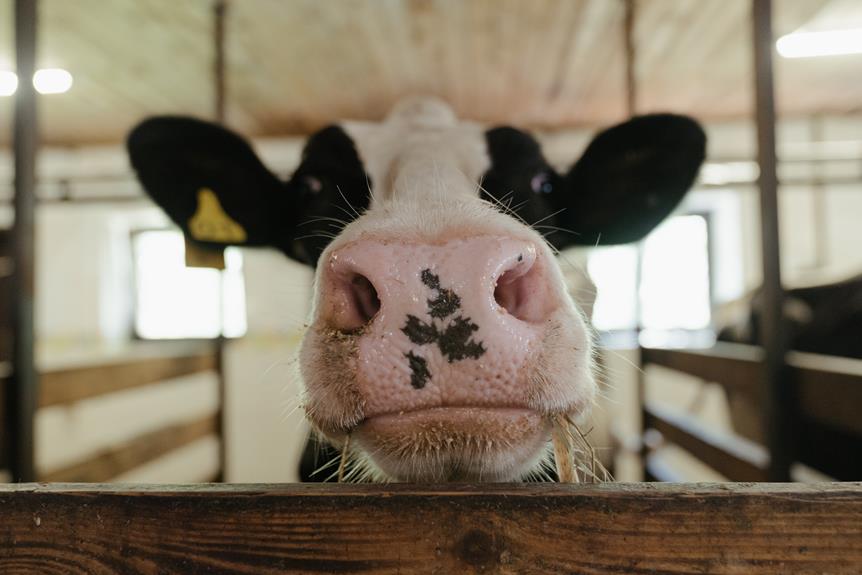Are you feeling blocked or stuck in life? You may be considering the ancient practice of putting cow ghee in the nose. This practice is said to bring a sense of clarity and spiritual liberation.
In this article, we'll explore the potential benefits, risks, and side effects of using cow ghee in the nose. We'll also discuss some alternatives that may be just as effective.
Let's begin our journey and see if cow ghee is the right choice for you.
What Is Cow Ghee
You've probably heard of cow ghee, but do you know what it's exactly?
Cow ghee is a clarified butter commonly used in Ayurvedic practices, such as nasal irrigation. It's a staple in Indian cuisine and is believed to have health benefits.
Ghee is made by cooking butter and separating the fat from the milk solids. It has a higher smoke point than regular butter, making it an ideal choice for cooking.
Many people choose to use ghee in their diet for its flavor, aroma, and potential health benefits.
Potential Benefits of Using Cow Ghee in the Nose
You may experience potential benefits from using cow ghee in your nose, such as improved respiratory function and improved sinus health. Cow ghee can act as a purifying agent for airways and help combat sinusitis.
It could:
- Enhance overall respiratory health:
- Clear mucus and reduce inflammation
- Strengthen lungs and reduce phlegm
- Support sinus health:
- Provide relief from colds and allergies
- Reduce congestion and open nasal passages
Allowing for improved breathing and an overall sense of wellbeing.
Risks Associated With Using Cow Ghee in the Nose
Although using cow ghee in the nose could provide potential benefits, you must be aware of the risks associated with it. Medication interactions, nasal irritation, and other side effects could occur.
Before attempting this practice, consult a healthcare professional. And make sure to use only pure cow ghee to reduce the risk of negative reactions.
Be mindful of any signs that the ghee is irritating your nose and discontinue use if needed. Seek medical attention if symptoms persist.
Educate yourself and use caution when trying any new practice for liberation.
How to Use Cow Ghee in the Nose
To safely use cow ghee in the nose, you'll need to be aware of the potential risks and benefits of this practice.
Benefits:
- Cow ghee has medicinal uses, such as helping clear the nasal passages of mucus and promoting respiratory health.
Safety Concerns:
- Cow ghee can cause allergic reactions, so it's important to use a small amount and monitor how your body reacts.
For maximum benefit, use cow ghee only as directed and consult a medical professional if necessary.
Alternatives to Using Cow Ghee in the Nose
If you're looking for an alternative to using cow ghee in the nose, there are several options available.
Natural remedies such as neti pots, steam inhalation, and saline nasal sprays can help to clear the nasal passages.
Ayurvedic medicine also offers a variety of herbs and oils that can be used to clear sinuses.
Additionally, there are over-the-counter medications available that can help to reduce congestion and inflammation.
Whatever you choose, make sure to consult your doctor first.
Frequently Asked Questions
Does Cow Ghee Need to Be Refrigerated?
You don't need to refrigerate cow ghee, but you should always keep it in a cool, dark place. Be careful when applying it, as potential risks exist. Follow instructions closely to ensure you get the best results.
How Long Can Cow Ghee Be Stored After Opening?
Storing cow ghee is like keeping a secret; follow the tips to avoid usage risks. Keep it sealed and in a cool, dry place; unopened, it can last up to 12 months. Open it and use it quickly – its shelf life is reduced to 3 months. Take care and enjoy liberally!
Are There Any Age Restrictions for Using Cow Ghee in the Nose?
You may have different taste preferences and nasal sensitivity levels, but there are no age restrictions for using cow ghee in the nose. Consider the consequences before trying it out to ensure safety.
Does Using Cow Ghee in the Nose Have Any Long-Term Effects?
You may want to consider alternative treatments for nasal hygiene rather than using cow ghee in the nose. Long-term effects have not been studied, so it's best to seek medical advice before trying this.
Is Cow Ghee Safe to Use During Pregnancy?
"You may want to think twice before using cow ghee during pregnancy. Alternatives are a safer bet, and exploring the potential health risks could save you a lot of grief down the road. Don't let yourself get caught up in the heat of the moment; weigh your options carefully for a healthier outcome."
Conclusion
Using cow ghee in the nose can have potential benefits, but also carries risks. It's important to understand the effects of using cow ghee, and if you decide to use it, to use the proper technique and amount.
There are alternatives to this practice, so be sure to do your research and find the best solution for you.
In the end, it's important to be informed and make the best decision for your health and wellbeing.

